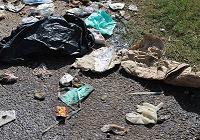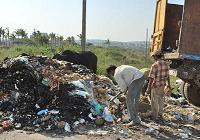Biomedical Waste
Background


A police complaint of the act was made. Since the waste was a mixture of non hazardous canteen waste and hazardous biomedical wastes, M/s Apollo Hospital was advised to collect and dispose the waste dumped as per the Biomedical (Management and Handling) Rules, 1998. It was however observed the next day that workers who came to collect the waste were doing so without any protective gear.
Proper handling and management of Biomedical Wastes demands segregation as a first step. However, even more important is that Biomedical waste should not be mixed with normal garbage as doing so would make even normal garbage which can be dumped in a landfill without any pre-treatment hazardous in nature. The waste observed in this case was a mixture of hazardous biomedical waste and canteen wastes and confidential patient information like investigation slips and hospital reports. The hospitals have thus not only violated the rules for proper handling and management of biomedical wastes but have also foregone the medical ethics, by posing a threat to health of people living around the area where it was dumped and randomly throwing confidential patient information without shredding such personal information.
See also:
ESG is an independent not-for-profit organisation that promotes the cause of environmental and social justice through research, documentation, advocacy, training and campaign support. We aim to support the rights of local communities and voiceless ecosystems in a responsible, progressive manner that keeps contextual complexities in mind.

